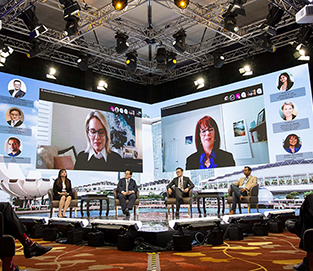Sustainability in events: It’s all about balance
Event organisers need to implement a long-term sustainability strategy that strikes an effective balance between supporting business recovery and becoming an environmentally viable business.
An opinion piece by Aspect CEO, Jo Randle
When I was a mum to very young children and worrying about what they were (and, often, weren’t) eating, a helpful health visitor gave me some solid advice: don’t focus on their food intake in a single day, look at it over the course of a whole week. It would give me a much more balanced perspective – and keep me sane.
I feel there are some parallels to be drawn with the current – much needed – impetus in our industry to improve the sustainability of events. With the UN Climate Change Conference of the Parties #cop26 taking place in Glasgow and Italy later this week, businesses are naturally looking inward to reflect on their role in accelerating action towards the goals of the Paris Agreement. Those organisations with event programmes will be focused on implementing the necessary changes to support their wider CSR initiatives.
The outbreak of Covid-19 last year makes this timelier and more relevant than ever before. Not only did the pandemic cause the events industry to grind to a halt, it also allowed us to take stock of the environmental impact of live events in terms of travel, energy consumption, and physical waste. As a catalyst for change, it could not have been more significant or effective.
We recognise that certain types of events, such as trade shows, will always be most effective in person. Once live events return fully post-Covid, some of the immediate improvements businesses can make include choosing clean energy destinations and sustainable venues, expanding electrical transport options, prioritising plant-based catering, implementing carbon off-setting, and reducing plastic waste on-site.
The real opportunity for a step change in sustainable event planning comes in the shape of virtual and hybrid event formats. With reduced travel and physical waste, the carbon footprint generated from virtual and hybrid is much smaller – great news for the planet. However, it’s not completely negligible. From social media apps to video hosting platforms, the internet still uses energy to store and transmit data.
And therein lies the rub. Taking advantage of the innovations in technology, sustainable events raise awareness and inspire change, cut costs, open a world of sponsorship opportunities, and boost an organisation’s reputation, all while meeting its environmental objectives. But it is a complex area and there is no one-size-fits-all solution. With businesses needing to meet their commercial objectives at the same time, the subject of sustainable events is best tackled as part of a balanced approach to audience engagement.
Creating communities and ensuring consistency of brand messaging remains a priority for any business wanting to engage with its audiences on an ongoing basis, be that its customers, its people, or its partners. Adopting a long-term sustainability strategy with an integrated communications approach to event marketing will make the journey towards being an effective and environmentally viable business more manageable and more achievable.

























